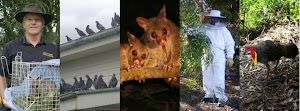Most people have an inborn fear of spiders. See a spider and the first instinct of many is to grab the trusty thong or fly-spray can and kill them. However, spiders have a critical role to play in the environment and shouldn’t be a natural focus of pest control in Brisbane. Spiders are nature’s champions in terms of controlling other insect populations by helping reduce the numbers of mosquitoes, midges and other pests. Spiders are also a key food source for a number of our birdlife.

The problem comes when spiders decide that inside a home is the perfect hunting ground for insects. It is impossible to eliminate spiders permanently from an area. New spiders readily move into a vacant area if the inhabitants are killed off, and many young spiders travel large distances by “ballooning” or spinning silk strands that are blown by the wind into new areas.
However, there are things you can do to reduce spiders around your home.
- Keep trees and vegetation pruned back from your house.
- Ensure all doors have weather seals and that all windows and wall vents have fly screens fitted.
- Reduce breeding grounds for mosquitoes by keeping containers clear of water.
- Put your external lighting on a sensor basis, rather than on full time at night. This will reduce the numbers of insects attracted to the lights (and the number of spiders attracted by an easy meal).
- Keep a clear area around the house to reduce the likelihood of burrowing spiders.
While many spiders are venomous, there are only four Australian spiders whose venom is in any way deadly to humans – the Sydney Funnel Web, Redback Spider, Mouse Spider and White Tail Spider. Bites from these spiders require urgent medical attention. Try to take the spider with you to the doctor for positive identification.
To reduce your risk of being bitten, always wear shoes in the yard (especially at night). When gardening, wear protective gloves, long sleeved shirts and trousers. Regularly check around BBQs, outdoor settings and outdoor play equipment in case a Redback has moved in. You should also check your shoes and gardening gloves before putting them on. Finally, teach your children “look but don’t touch” with all spiders.







